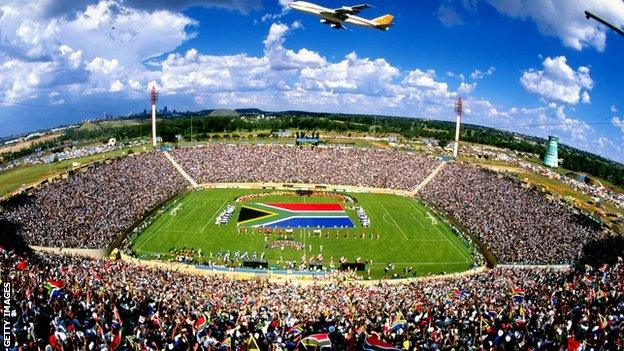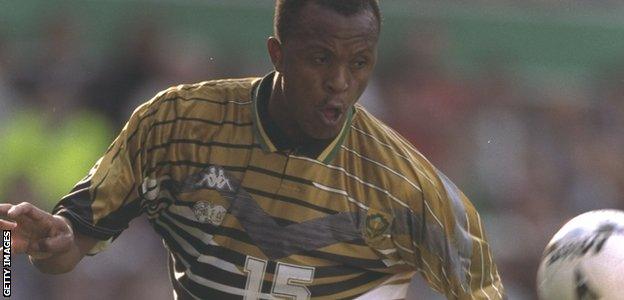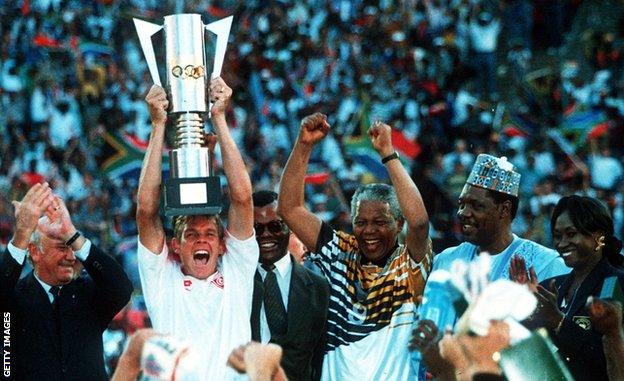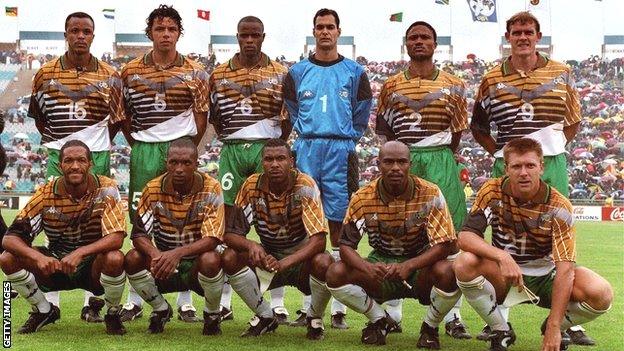South Africa marks 30 years since return from footballing wilderness
- Published

South Africa would go on to host - and win - the 1996 Africa Cup of Nations four years after returning to the Fifa ranks
On Thursday, South African football celebrates 30 years to the day since the country's national team returned to the playing field after decades of apartheid-enforced isolation.
The game against Cameroon, who had captured Africa's imagination - including that of pariah state South Africa - with their run to the 1990 World Cup quarter-finals, was the first of three and ushered in an exciting time full of hope and expectation.
Four days before it took place, on 3 July 1992, South Africa's membership of world governing body Fifa - which had been suspended in 1964 prior to expulsion 10 years later - had been restored.
This came after the demolishing of apartheid had led to the creation of a new multi-racial South African FA (Safa) a year earlier.
The first meeting was in the rain at Durban's King's Park on 7 July, with a strike by the Media Workers Association of South Africa meaning there was no television coverage. Today, some 30 years on, there are, sadly, minimal visuals from that game.
Nonetheless, history records that giant striker Phil Masinga, later to play in England for Leeds United and in Italy's Serie A for Bari, was the first South African man to touch the ball.
The game was no classic; rather, an edgy affair with Cameroon unsure what to expect and South Africa looking a little aimless in their approach, as if international football was far removed from the domestic game.
But despite the horrid weather, it was a celebration with some 40,000 braving the elements and the result, perhaps to script, going in South Africa's favour after a late penalty.
"When the ball hit the back of the net, the stadium went wild and I celebrated more out of relief than anything else‚" Doctor Khumalo, who tucked away the spot-kick, told BBC Sport Africa.

Doctor Khumalo scored South Africa's first goal after their return
"Even after the game‚ it was just another penalty scored and I was relieved that I had not missed!
"But then the next day or the day afterwards, someone said to me‚ 'Man‚ what does it feel like to make history?'. It was only then that I really thought about it and the significance of that goal to South Africa and to me."
Yet to be nicknamed Bafana Bafana, the side took on a Cameroon squad that bore little resemblance to the one at Italia '90 but local fans quickly fell in love with France-based midfielder Jean-Claude Pagal on account of his play and dreadlocks.
Roger Milla, meanwhile, had originally been invited as a guest with the Cameroon delegation but donned his boots for the first time after his World Cup exploits (and ended up playing every minute of all three internationals).
Cameroon extracted revenge two days later in Cape Town, despite having two players sent off, before the last match of the series, two days after that at Soccer City, ended 2-2.
Onward to glory
It was the release of future South African president Nelson Mandela in 1990 that precipitated the return of South African sports to the international arena, a considerable time before the country's political structure were overhauled and first democratic elections held in 1994.
Football had been among the first sports to be banned because of the country's apartheid policies, but once Mandela had been released and the transformation process began, the process of reintegrating South Africa into the Fifa fold went quickly.
Yet it was on the African front that South Africa was first invited back into the world footballing family, when asked to attend a Confederation of African Football (Caf) congress in Dakar in January 1992 as observers.
There, they were introduced to the assembled delegates and, to the delighted surprise of the South African delegation, given a standing ovation.
It was a far cry from 1960 when Caf was the world's first sporting organisation to expel South Africa as a result of its politics.

Neil Tovey lifted the 1996 Nations Cup trophy with Nelson Mandela, the man who made it possible, alongside him
Just over three decades on, Caf swiftly accorded the newly-created Safa affiliate status but, as per its own statutes, could not allow proper membership until its parent body Fifa had done so.
Nonetheless, African football's ruling body entered South Africa into the preliminaries for the 1994 Africa Cup of Nations.
Yet South Africa's membership was restored at the Fifa congress in 1991 and, for the only time in its history, football's global body flouted its strict rules on entry to the World Cup qualifiers.
The Zurich-based organisation allowed South Africa to come in as a late replacement for the island nation Sao Tome e Principe, who had withdrawn from the preliminaries for the 1994 tournament in the USA.
They also offered the same opportunity to Namibia, which had become an independent nation two years earlier but joined Fifa's ranks at the same time as South Africa's re-admission.
In October 1992, South Africa made its World Cup debut, handed a tough lesson in the rigours of the international game as Nigeria hammered them 4-0 at the National Stadium in Surelere, Lagos.
But within four years, Bafana Bafana had become African champions - winning the tournament on home soil after being entrusted with hosting - before they then qualified for their first World Cup, in France in 1998, an achievement swiftly followed by another appearance in 2002.
Today
South Africa will be disappointed with their progress over the past 30 years after showing such initial promise upon their return to international football.
Bafana Bafana won their first Africa Cup of Nations, were runners-up two years after that before finishing third in 2000 - but have never attained those heights since.
Embarrassingly they missed out in 2012 when they got the permutations for their last qualifier wrong, so playing for a draw which they thought would be enough after failing to understand the rules on head-to-head clashes as opposed to goal difference in deciding the group places.
At World Cup level, qualification in 1998 and 2002 suggested they would be among Africa's regulars but they have only played at the 2010 finals since - because they were the hosts.
Yet the party was swiftly spoiled as South Africa became the first - and only - host nation to ever be eliminated at the first stage.
Safa has arranged little celebration to mark this 30-return to international football but after failing to even qualify for this year's Nations Cup in Cameroon, is there much to celebrate?

South Africa faced hosts France at the 1998 World Cup, including Kumalo (back left) and Phil Masinga (back row, third from left) in their starting XI